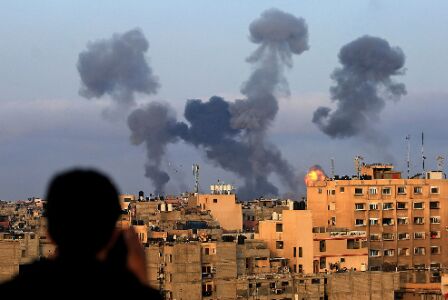Tipping point

The long-drawn Israel-Palestine conflict has taken a tragic turn leaving both countries burning in the fire of communalism. This is yet another situation where an over-stretched impasse, backed by divisive forces, has let communal tensions build up to a threatening scale. The ferocity of current conflict is greater in magnitude than that which occurred over the past few decades. The turn of violent events started getting momentum around Monday with a small incident in Jerusalem and by Wednesday night there was a lethal exchange of rockets and airstrikes between the two sides. The conflict has so far seen the death of around 69 Palestinians including children and at least six Israeli civilians. People are finding shelters hither and thither, and several crucial services are obstructed. Further, the signs of possible consensus are lacking with both sides adamant upon their stance. The airstrikes and firing of rockets at the behest of forces from both sides is on the rise. This is indeed terrifying but only a part of the entire story. What is unfolding on the streets of Israel is more concerning. There have been reports of mobs of Jews and Palestinians beating each other at different places. The religious hatred that has trickled down from the leadership level could aggravate the conflict to a great extent. While the Gaza conflict may be the immediate cause of the rioting, it was cooking in the country over the years with the Arab minority finding itself as being sidelined and oppressed for over decades. Any conflict that arises in any part of the world is not just the consequence of the actions of involved players. It is important to understand the larger environment that has fueled a small incident to take the form of a transnational conflict. This environment is not just limited within the boundaries of Israel and Palestine. The conflict between the two nations has been the spotlight of International diplomacy for over decades with Israel having the backing of the US which still represents a separate block in itself. Arabs, on the other hand, right from the formation of Israel see it as the proxy of the US and support the Palestinian cause. This global split has deepened the trench existing between the two countries. Decades of diplomacy has failed to bridge the gap. Even in the current situation, US President Biden, while hoping for the conflict to end soon, has added a one-liner that Israel has the right to defend its territory — clearly taking a side. Turkey's Vice President Fuat Oktay appealed to Muslim nations to take a clear stance over Gaza. He calls for an active response rather than just condemnation. It must be understood that division can never be part of the resolution. The solution has to come through consensus and understanding. The global leadership should speak and talk on the issue but not on divisive lines; the solution should be thought out through the perspective of suffering the people are forced into both countries. Israel's military capabilities are widely acknowledged across the world. Its establishment can do well to refrain from high-handedness. The military establishment of Israel has vowed that they would end their operations only after there is 'complete quiet' and that it is ready for the "worst-case scenario".
It can just be hoped that better sense prevails and both parties reach a consensus. Global leaders must intervene promptly to solve the issue in the immediate run. Any delay in this scenario would add up to the ongoing destruction, at the same time, the conflict and the riots will cyclically fuel themselves to take monstrous forms. The immediate toning down of the situation will be only half work done. After the countries come out of the conflict, they should consider an alternative framework to work out their differences. The present state of diplomacy between Israel and Palestine has apparently failed to serve its purpose. It also needs to be considered how much of the problem is to be solved internally, and to what extent, global intervention is required.



